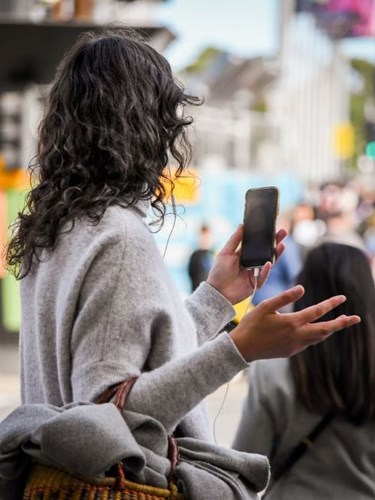Mental Health Awareness Week 2022: Loneliness
09 May 2022
The Mental Health Foundation has announced the theme for Mental Health Awareness Week 2022: Loneliness.
Mental Health Awareness Week (MHAW) falls from Monday, 9 May - Sunday, 15 May. While we sometimes think of mental health as only being relevant to people with serious mental health difficulties, nothing could be further from the truth.
Everyone has mental health, just like everyone has physical health. MHAW provides us all with a chance to stop and take a look at how our own mental health is doing.
Loneliness is an emotion we likely all have experienced at one point or another in our lives. It can range from a fleeting, one-off experience here and there (for example, if no one wishes you a happy birthday) to a larger pattern of feeling isolated and cut off from others - either emotionally, physically, or both.
Loneliness can be especially difficult for students who leave home to study. Living away from friends and family networks can be incredibly tough at times. It can be especially hard for international students, who live, study, and work a long way from the majority of their support systems.
Rae’s experience
We spoke to Rae* about her experience of experiencing loneliness as an international student.
“I moved to Scotland in 2014 for my PhD programme. I’m originally from the United States, and I come from a close-knit family. Before moving here, I’d never even lived outside my home state before, much less in another country. While I’d visited other places on holidays and once studied abroad for a summer in Germany, this was the first time I was separated from my entire family and all of my friends for an extended period of time."

“I found it extremely difficult. I had never been to the United Kingdom before, so I was totally out of my depth. While English is my first language, there were still multiple communication barriers that I hadn’t anticipated, such as struggling to understand certain accents or being confused by significant differences in language."
“I had nowhere to live at first; it was pure survival, with minimal support from my university. I relied on the kindness of strangers in my programme. I have such a huge, reliable support system at home; it felt alien and frightening to be completely on my own here."
“It was also very hard to adapt to a new culture and country without knowing anything about it - for example, I really struggled to understand the NHS system. As I like to say, ‘You don’t know what you don’t know.’ And so many people don’t understand that; their system makes total sense to them, so they look at you a bit funny when you’re confused and lost in a system that they take for granted. Sometimes, I felt like a little kid who just wanted my mum."
“I don’t make friends very easily at all - I’m very shy - and it was hard to connect with people. I wanted to go home for so much of my first several months here - I’d say it was difficult even up to a year since I was here. I went through long periods of isolation and depression. It was so tough. I’ve never felt so alone in my life, and I didn’t feel like anybody around me could really understand the depth of that loneliness. I felt like I was on my own.”
*Rae is a pseudonym for anonymity
What you can do if you are experiencing this type of loneliness
Rae says that one step she took was to buy a new phone and set up a group chat with her parents and sister, so that they could be in easy, fast communication at all hours. Her parents got smartphones for the first time in their lives, just so they could keep in contact with her, and that helped. She also set up a monthly Zoom hangout with some of her closest friends back home, so that she could keep in regular contact with them as well.

“It wasn’t the same as actually being there,” Rae says, “but it helped a lot. Keeping those connections and talking to people who just totally understood me was so vital.”
Rae also made an effort to connect with people on her programme; she asked a few women on her course to join her for coffee after classes, for example, and she also started attending a few of the social events that were advertised through the university."

“It wasn’t my style at all, and I found it kind of hard, but it made a huge difference, Rae says. I also learned to take it easy on myself, as well. Some days or weeks were harder than others, and I learned that that’s incredibly common for international students and immigrants in general. I learned to go with the flow and allow myself to feel how I felt. Journaling was also helpful during some of those especially rough slumps.”
In the second year of her programme, Rae decided to audit another literature course outside of her programme, just for fun.
“We had to audit a class for my programme, anyway, and I went with one that just looked enjoyable,” she says. “I was hoping to read some new material and maybe meet some new people. As it turned out, I ended up meeting my future husband on that course!”
Rae has finished her programme and settled permanently in the United Kingdom in order to stay with her husband, who is Scottish. She still struggles with periods of loneliness, but it’s much better than it once was.
“I have my husband and my cats, I have great friends, I have lovely colleagues, I have an amaetur theatre group that I belong to,” she says. “It’s all genuinely wonderful. But sometimes homesickness and loneliness still hits me, and I think it’ll probably always be that way."
“My advice is to make new connections where you can, and also work to keep those old connections current, too. Reach out to people back home, even if you’ve been in a slump or a busy period and haven’t messaged them for months. You’ll be surprised how happy people are to hear from you, and how much it can really help you feel more connected and less adrift.”
Where can you look for extra support?
For more articles on this and lots more, head to Kooth Student online, links can be found in the aparto residence facebook groups or obtained from reception. Kooth Student is a free, anonymous, BACP-accredited mental health and wellbeing support service.
The site has hundreds of helpful articles like this one, plus tools such as a goal tracker, online journal, and discussion boards, where you can receive and offer support to others. It also gives you access to a team of professional mental health practitioners who you can chat to online, anonymously, one to one.



